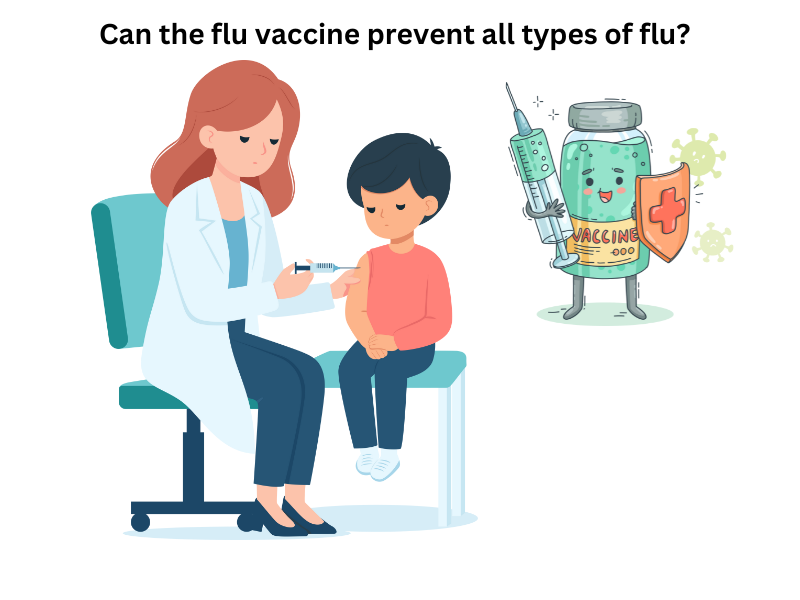The flu vaccine is an essential tool in the fight against influenza, but can it prevent all types of flu? This question often arises as individuals seek to understand the vaccine’s scope and limitations. While the flu vaccine is highly effective at reducing the severity and spread of influenza, it doesn’t provide complete immunity against every flu strain. Let’s delve into the details to understand how the flu vaccine works, its benefits, and its limitations.
How the Flu Vaccine Works
The flu vaccine is designed to protect against the influenza viruses that research predicts will be most common during the upcoming flu season. It introduces inactivated or weakened virus versions into the body, prompting the immune system to produce antibodies. If exposed, these antibodies prepare the body to recognize and fight off the actual virus.
- Targeted Protection: Each year, the vaccine targets specific influenza A and B strains.
- Seasonal Adjustments: Scientists update the vaccine composition annually based on global surveillance data.
Does the Flu Vaccine Cover All Flu Strains?
The short answer is no. The flu vaccine does not prevent all types of flu. It primarily targets the most prevalent influenza A and B strains circulating during a specific flu season.
- Influenza C: This strain typically causes mild respiratory illnesses and is not included in the vaccine.
- Mutating Viruses: Influenza viruses can mutate rapidly, leading to new strains not covered by the vaccine.
- Cross-Protection: While the vaccine may not directly target all strains, it can still provide partial protection against similar viruses.
Effectiveness of the Flu Vaccine
The effectiveness of the flu vaccine varies yearly and depends on several factors:
- Match with Circulating Strains: A close match between the vaccine and circulating strains results in higher effectiveness.
- Age and Health of the Recipient: The vaccine is generally more effective in younger, healthier individuals.
- Timing of Vaccination: Receiving the vaccine before flu season peaks ensures better protection.
Benefits of Getting the Flu Vaccine
Even though it doesn’t prevent all types of flu, the vaccine offers significant advantages:
- Reduced Severity: If vaccinated individuals contract the flu, their symptoms are often milder.
- Lower Hospitalization Rates: Vaccination reduces the risk of flu-related complications, especially in high-risk groups.
- Community Protection: Widespread vaccination helps protect vulnerable populations through herd immunity.
Limitations of the Flu Vaccine
Despite its benefits, the flu vaccine has limitations:
- Limited Duration: Immunity wanes over time, requiring annual vaccination.
- Viral Evolution: The flu virus evolves, sometimes rendering the vaccine less effective.
- Incomplete Coverage: It does not cover non-influenza viruses that cause flu-like symptoms.
Should You Still Get the Flu Vaccine?
Absolutely. The flu vaccine is a vital public health tool, reducing the spread and impact of influenza. While it doesn’t prevent all flu types, its benefits outweigh its limitations. Vaccination protects individuals and contributes to broader community health.
FAQs
What types of flu does the vaccine target?
The flu vaccine targets the most common influenza A and B strains expected during the flu season.
Why doesn’t the flu vaccine cover all strains?
The vaccine is updated annually based on predictions, but influenza viruses mutate rapidly, making it challenging to cover all possible strains.
Can the flu vaccine cause the flu?
No, the flu vaccine cannot cause the flu. It contains inactivated or weakened viruses that cannot infect you.
Is the flu vaccine effective against COVID-19?
No, the flu vaccine does not protect against COVID-19. Separate vaccines are required for COVID-19 prevention.
How often should I get the flu vaccine?
You should get the flu vaccine annually as its protection diminishes and new strains emerge.
What if I’m allergic to the flu vaccine?
Consult your healthcare provider for alternatives or additional precautions if you have severe allergies.
Conclusion
While the flu vaccine cannot prevent all types of flu, it is a critical tool for minimizing the impact of influenza. The vaccine plays a pivotal role in seasonal flu prevention by reducing severity, preventing complications, and supporting community health. Ensure you get vaccinated annually to protect yourself and those around you.

